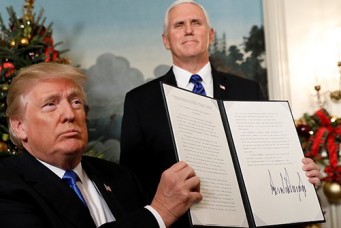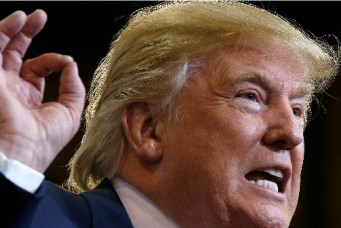Trump, Kushner, and the Anti-Establishment Circus
The Jared Kushner appointment is controversial and even shocking to many, but to Donald Trump it is the epitome and the heart of what he and America are all about.
Donald Trump’s appointment of his son-in-law Jared Kushner as a senior adviser in the White House has kicked up several controversies that perfectly capture the tone and substance of the Trump triumph across the American political system. But they also tell us nothing about what actual policies President Trump will pursue once he is the incumbent. The Kushner appointment offers important insights into the political, substantive, ethical, and attitudinal dynamics that continue to shape American society’s coming to terms with the fact that it has elected a controversial and very successful showman as its president.
Four dimensions of the Kushner appointment are worth pondering, and the fact that he is Jewish is not one of them. People’s religion in the United States is their own business, but if faith becomes entangled with one’s political positions—especially if this happens in the White House—then a discussion is necessary. This is not yet the case with Jared Kushner, so his religion remains irrelevant for the moment. Skeptics of this view should recall how the public call to focus on Palestinian rights by the Jewish-American presidential candidate Bernie Sanders did not hurt his candidacy, and may even has helped cement his reputation for proposing ethical policies by the United States government.
The four dimensions of the Kushner appointment that are worthy of analysis are:
1) His age and public policy experience: It is highly unusual for a 35-year-old person with no experience in government or pubic policy issues to suddenly assume immense power as a trusted adviser to the president of the United States. This could be frivolous and dangerous, or it could end up being harmless, mostly offering the psychologically convoluted new president a soothing and calming presence. We may find out soon.
2) Possible ethical constraints due to his extensive business investments with domestic and foreign partners: This also applies to many of Trump’s cabinet and other appointments of wealthy men and women with very serious investments and personal/political ties at home and abroad. This is likely to be the easiest question mark about Kushner to resolve, given the many models that have been used in the United States to resolve conflict-of-interest concerns in recent years.
3) Whether his appointment runs counter to the anti-nepotism laws in the United States that came into being to prevent presidents from allowing family members to have undue influence on policy-making: This is likely to be a non-issue in the long run, as Trump can appoint Kushner as his golfing adviser or consultant, and what they discuss on the golf course is their own business.
4) Any involvement he may have had in his family’s providing funds for illegal Israeli settlements, which are a crime in international law according to the latest UN Security Council resolution: This is the most problematic aspect of the Kushner appointment, given the clear illegality and other problematic dimensions of Israeli settlements that have been regularly reaffirmed, including by the current American president and secretary of state. If Kushner proves to be an explicit supporter of Israeli settlements—a strong possibility, given his support for appointing the settlements-loving David Friedman as the next American ambassador to Israel—then Trump is going to have to reveal if his son-in-law’s views are only his son-in-law’s views, or reflect and shape official American policy in the Israeli-occupied Palestinian and Arab territories.
These issues are now already being actively discussed and analyzed in the Kushner and Trump families, among the new White Houses senior staff, and by many lawyers. They all reflect one common denominator: Everything Trump has done in the past 18 months since he started running for the U.S. presidency is designed to challenge the American political establishment and the Republican Party’s traditional way of doing business. This approach has brought him enough media attention, grass-roots support, and votes to win the presidency, despite his many proven deficiencies, contradictions, and vulgarities.
The Jared Kushner appointment is controversial and even shocking to many because of the issues mentioned above. But to Trump it is the epitome and the heart of what he and America are all about: It is just one more link in a chain of anti-establishmentarian defiance by the new president, who is the product of riding the waves of what the American establishment cherishes most—wild capitalism and unbridled, sometimes vulgar, entertainment.
How many more of these incidents will it take for Americans to wake up from their combined stupor and shock to realize that repeatedly expressing amazement, anger, and bewilderment at Trump’s appointments and behavior is pretty amateurish behavior. For the real problem, in fact, is not Trump the person, but rather the distorted condition of the American political system that has allowed him to reach the presidency through a democratic process.
Rami G. Khouri is a senior fellow at the American University of Beirut and the Harvard Kennedy School. On Twitter: @ramikhouri.
Copyright ©2017 Rami G. Khouri — distributed by Agence Global





